Close to 30% of Respondents , Nearly Half of Males Aged 15-19 Are Aware of web3
Dentsu Inc. (President & CEO: Norihiro Kuretani; Head Office: Tokyo), announced today the findings of its first Consumer Awareness of web3 Survey. It was conducted in November 2022 as an initiative of the web3 club.* The web3-focused project was carried out jointly by Dentsu Inc. and the club across Dentsu Group companies in Japan.
The survey targeted 3,000 consumers nationwide between the ages of 15 and 69. It was executed to determine the degree of public awareness and understanding in Japan of web3 in order to facilitate widespread adoption of this rendition of the web, growth of related business, and industrial advances. The main findings of the survey are detailed below.
* An organization comprising members from across Dentsu Group companies in Japan, the web3 club conducts research on, and operates new businesses involved in, web3. It supports the businesses of corporate clients, while jointly developing projects with partners and integrating the web3-related initiatives of multiple companies in the Group. The club plans to conduct periodic Consumer Awareness of web3 Surveys to collect comparative data over time.
Key Findings
1. Awareness of web3 was highest among males aged between 15 and 19 at 48.6%, compared with 29.7% overall.
2. Respondents expect web3 to improve information security, prevent unilateral changes to related rules, and facilitate cross-platform use of tools, while the most knowledgeable respondents have big expectations for decentralized autonomous organizations (DAOs).
3. The most common concerns and dissatisfaction regarding web3 are the lack of public understanding, information security risks, and slow progress in updating relevant laws.
Note: The composition ratios in this release are rounded to the nearest unit. Consequently, some totals differ from the sum of the components shown.
Breakdown
1. Awareness of web3 was highest among males aged 15 to 19 at 48.6%, compared with 29.7% overall.
As shown in Graph 1, 29.7% of survey respondents expressed awareness of web3. Some 2.3% answered "I am aware of the term web3 and know a lot about it"; 6.2% "I am aware of the term web3 and know about it to some extent"; and 21.2% "I am aware of the term web3 but know nothing about it."
Among all respondents, 70.3% answered "I am not aware of it at all," indicating that many consumers in Japan have never heard of web3.
As shown in Graph 2, 48.6% of males aged between 15 and 19 were aware of web3, the highest awareness rate of the sample groups. Of this total, 12.1% answered "I am aware of the term web3 and know a lot about it"; 10.3% "I am aware of the term web3 and know about it to some extent"; and 26.2% "I am aware of the term web3 but know nothing about it."
Graph 1
Q. Answers, by all 3,000 respondents, to the question, "Which answer best describes your awareness of web3?"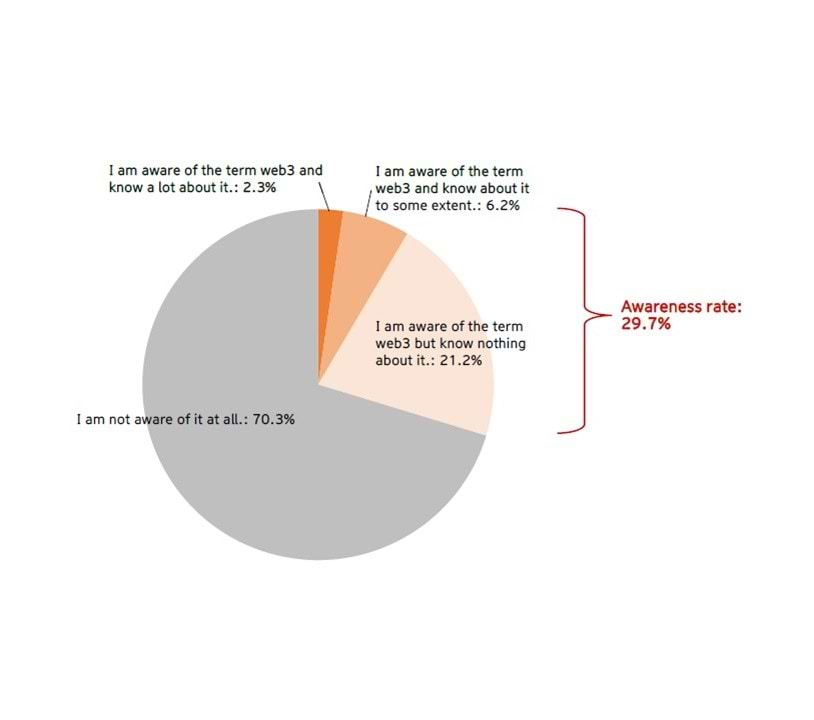
Graph 2
Q. Breakdown (by gender and age group) of responses to the question, "Which answer best describes your awareness of web3?"
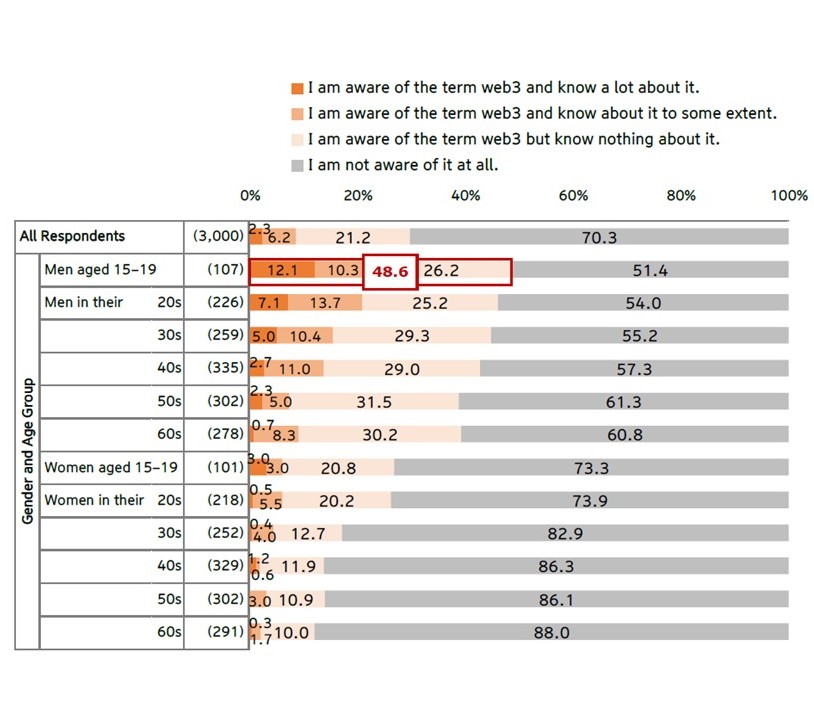
2. Respondents expect web3 to improve information security, prevent unilateral changes to related rules, and facilitate cross-platform use of tools, while the most knowledgeable respondents have big expectations for decentralized autonomous organizations (DAOs).
Respondents who answered either "I am aware of the term web3 and know a lot about it" or "I am aware of the term web3 and know about it to some extent" in replying to the first question were also asked about their future expectations for web3.
As Graph 3 shows, the answer chosen by the majority (36.5%) of these respondents, was "I expect it to improve information security through decentralization."
Meanwhile, each of two answers--"I expect it to prevent specific companies from unilaterally changing web-related rules" and "I expect it to result in more use of tools, items, and data across various digital platforms"--was given by 34.1% of the respondents.
In addition, "I expect it to allow DAOs to change current corporate structures and systems" was selected by 50.0% of respondents who answered, "I am aware of the term web3 and know a lot about it." This is the most common expectation among the most knowledgeable members of this group.
Graph 3
Q. Responses to the question, "Which answers best describe your expectations for web3 in the future (multiple answers are acceptable)?"
Responses from 255 respondents who expressed having knowledge of Web3*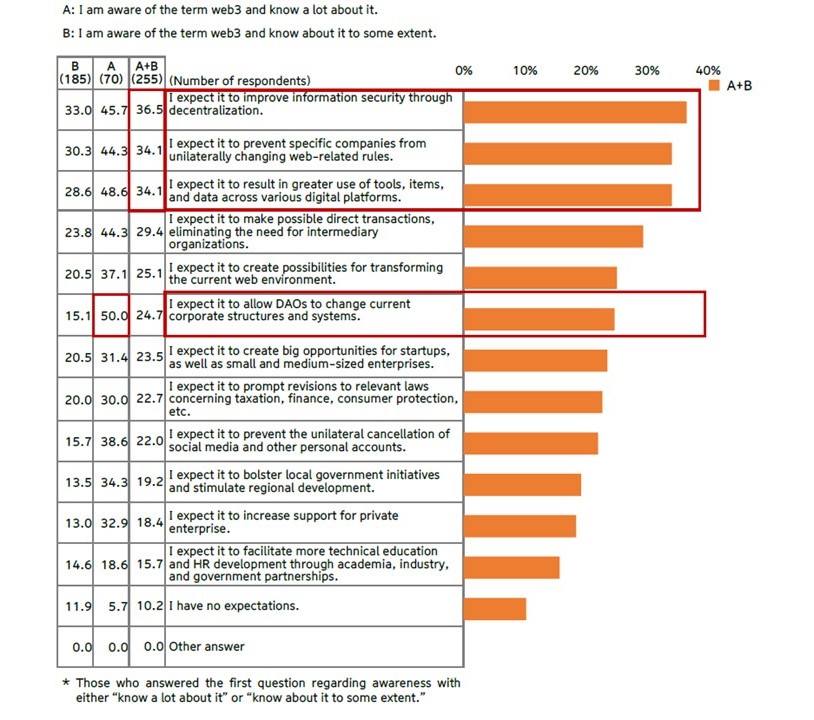
3. The most common concerns and dissatisfaction regarding web3 are the lack of public understanding, information security risks, and slow progress in updating relevant laws.
Survey respondents knowledgeable about web3 (answering the first question with either "I am aware of the term web3 and know a lot about it" or "I am aware of the term web3 and know about it to some extent") were asked about their concerns and dissatisfaction regarding the current state of web3.
As shown in Graph 4, the most common answer, chosen by 29.4% of respondents, was "There is a lack of understanding of web3 among members of the public." Some 29.0% and 28.2%, respectively, of respondents chose the answers, "The threat of cyberattacks is a risk for information security" and "Progress is slow in updating laws concerning taxation, finance, consumer protection, etc."
Graph 4
Q. Responses to the question, "Which answers best describe your concerns and dissatisfactionregarding the current state of web3 (multiple answers are acceptable)?"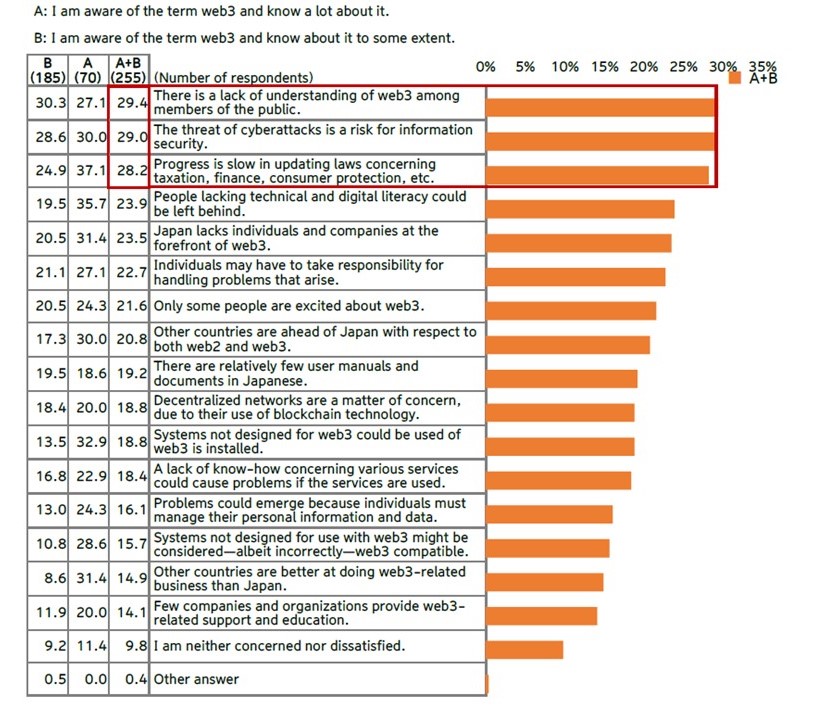
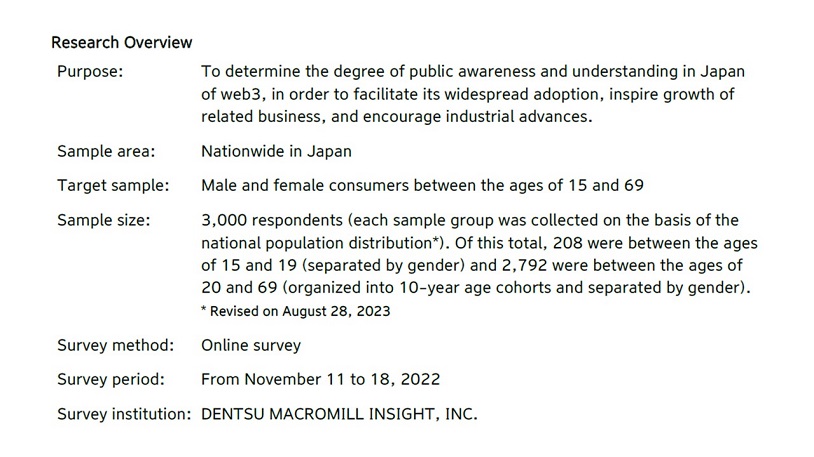
#####
Contact
Media-related inquiries:
Corporate Communications Office, Dentsu Corporate One Inc.
Email: global.communications@dentsu.co.jp
Survey-related inquiries:
Integrated Solutions Division 4, Dentsu Inc.
